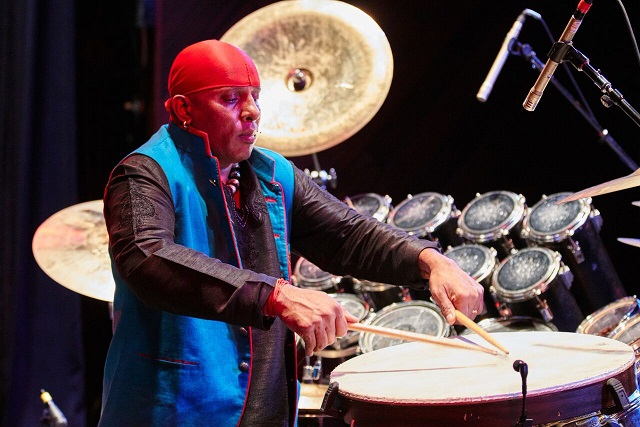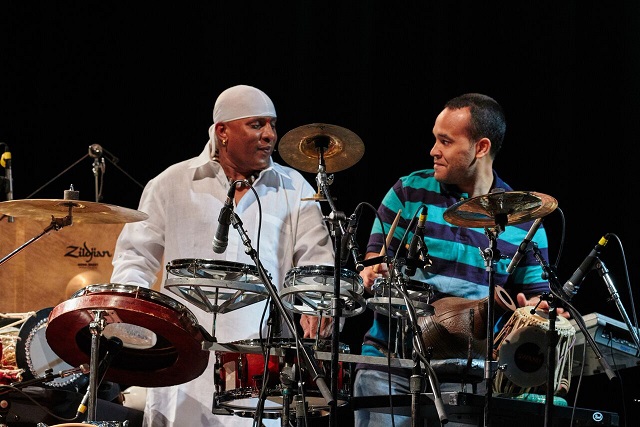Contribute
| Meet Sivamani Anandan, Percussionist |
Shuchita Rao
06/25/2015
Fathers could not have asked for a better present than a lavish feast of sound and rhythm served up by percussion pundit Anandan Sivamani at the Berklee Performance Center on Father’s Day. Protégé of the Western drummer S M Anandan who played for famous South Indian music directors such as Illaya Raja and K V Mahadevan, Sivamani has followed his father’s footsteps and has played for numerous Bollywood films including music composer-director A.R Rahman’s works such as Roja, Bombay Dreams, Saathiya and the Oscar winning film Slumdog Millionaire. Sivamani’s passion for percussion and spontaneous creativity were supremely evident in the interactive workshop for students held in conjunction with percussion weekend at the Berklee College of Music on Saturday June 20 and Sunday, June 21, 2015. The renowned percussionist visited classrooms, conducted master classes for students over 15 years of age in addition to presenting an interactive performance during Berklee’s Percussion Weekend.
“You are lucky to study at Berklee†said Sivamani in his opening remarks to Berklee students. Dressed in black overalls and a bright cobalt blue vest, sporting a large metal bead necklace around his neck and a shiny red scarf tied tightly around his head, Sivamani said “Music is God†and went on to rhythmically chant a Sanskrit shloka “Matha Pitha Guru Devo Ganapathi Shankara Thaka Dhina Thomâ€. Moving between several stations setup on the stage consisting of a diverse array of percussion devices, (one headed drum, two headed drums, metal drums, wooden log drums, congas, Indian dumroo, dholak, tabla, kanjeera, slapstick, bells, steel utensils, whistles etc) he created a vivid collage of multifarious sound patterns ranging from what sounded like the steady pitter-patter of monsoon rains to the bold and energetic match of soldiers charging into a battlefield. Barely audible beats rose to raging crescendos and retreated back to silence in a masterful display of rapid wrist movements.
At times Sivamani played with his bare hands and at other times with drum sticks drawing applause when he expertly juggled the drumsticks into mid-air while playing the drums. He blew the Indian conch shell (shankh) victoriously, sounded shrill whistles and created the magical rhythmic sounds of a moving train with his long breath. A plastic bucket containing water was placed on one of the stations facing the audience. He charmed the audience by immersing a Tibetan gong and ghungroo dance bells into the water while striking them so that music with varying pitches emerged. His rhythmic work on a long slapstick made a member of the audience sitting next to me scream “I want that!â€
The hour long show had elements of innovation. At one instance Sivamani walked off the stage only to re-emerge wheeling in a large hard-shell suitcase onto the stage. He played away with drumsticks inviting the audience to participate in a conversation centered around rhythm. He surprised several members of the audience by walking up to them, giving them a drumstick in their hands and collaborating on the spot by creating call-response sound patterns. He divided the audience into two groups and had them take turns in repeating varying sound patterns while he raised his left and right hands. An interactive experience brought together people from diverse cultures and constantly engaged them through the magnetic medium of percussion.
He ended the hour long performance by thanking the president of Berklee College, Dr. Roger Brown (who happens to be a drummer himself), several members of the staff and left the stage with the simple but powerful advice to the students: “Practice!â€
Shuchita Rao spoke to Sivamani Anandan about his career as a drummer.
Q. Do you remember your very first encounter with music and rhythm? What was it like?
A. It was the day I started listening to my mother’s heartbeat while I was in her womb. When I was born I met my father Sri S M Anandan, who was a professional drummer for K V Mahadevan’s orchestra.
Q. What about your grandfather. Did he play the drums or Mridangam?
A. My father’s father Sri Subbarayan was a school principal in Chennai. The school is still running – it is 117 years old. My mother’s father ran a business that manufactured and distributed curry powders internationally.
Q. Did you routinely accompany your father to recording studios in Chennai?
A. I used to take lunch for my father to the recording studio and watch the composer and musicians in action. They realized that I had a sense of great rhythm in me.
Q. Who would you say have been major influences in your life and career?
A. My father was my first teacher. Other great influences were Noel Grant, Billy Cobham, Trilok Gurtu and Louis Prabhakaran. I got into fusion because of sitar player Ahmed Hussain and Malcolm the violinist in K V Mahadevan Sir’s orchestra.
Q. The Indian Taala system is highly evolved. Did you not want to understand it by taking Mridangam lessons?
A. There were many genius percussionists in South India. They used to call me often and invite me to take lessons. I used to keep very busy in the studio and so I would end up taking lessons from the percussionists who visited the studios such as Vikku VinayakRam, Umayalpura Sivaraman etc. I would learn tihais and korvai patterns from them and practice them a lot.
Q. When did you get your first break into playing for films?
A. I was pretty young when S P Balasubramanyam, the famous vocalist for South Indian films discovered my talent. He took me with him for road shows and I got noticed by great music composers like M S Viswanathan and Illaya Raja. They gave me opportunities to play with their orchestras.
Q. What does your practice regimen look like?
A. I practice atleast six hours a day. I practice while driving and even when I am in a traffic jam.
Q. You have collaborated with several artists. Who do you like to jam with the most?
A. Ustad Zakir Hussain. I have made an album with him.
Q. What are your plans for your next album?
A. I have already done four music albums. My wife, the singer Runa Rizvi and I are working on releasing an album called Tu hi Tu†next year.
Q. Is there a venue (that you have not played at yet) that you dream of playing at?
A. Madison Square Gardens in New York City.
Q. What is your advice for aspiring percussionists?
A. I tell my students that if they want to be professional drummers, they have to imagine that they have jumped into the ocean. They have to just keep swimming – there is no end!!!
You may also access this article through our web-site http://www.lokvani.com/


